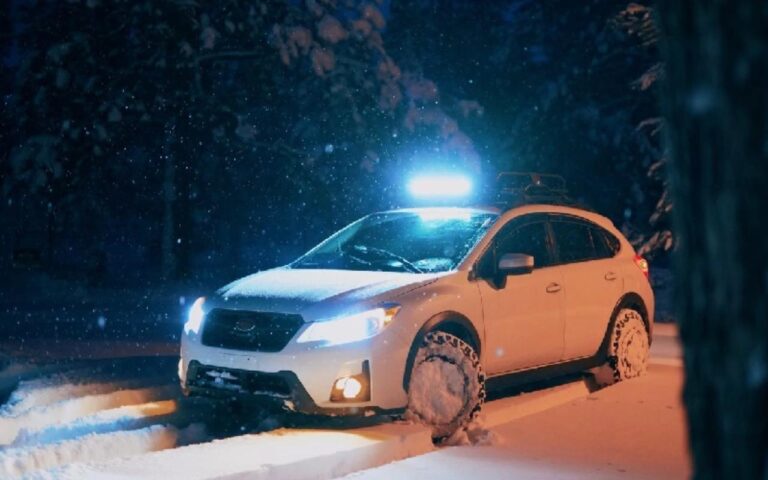You probably have read from online forums or reviews that mud tires or off-road tires do not perform well in the snow. Some online references say that mud tires are good for snow driving. So, which is correct? Are off-road tires good in snow?
Off-road tires can perform on terrains covered with deep snow but are not ideal for light ice and snow-covered roads. However, the use of off-road tires in the snow is not guaranteed safe.
It is important to note that the type of snow matters. Some types of snow fill up the channels of your off-road tire and will make it less effective in handling the challenges of ice and snow driving.
Read on to learn more details on the scenarios when your off-road tires work well on snow and when they don’t.
Off-Road Tires on Deep Snow
Off-road tires are, of course, for mud and off-road adventures. However, they can also work in deep snow to some extent. Some users in online forums report that off-road tires can do well in deep snow.
The aggressive tread pattern of the off-road tire somehow helps it provide some snow capability. Users suggest reducing the tire pressure for it to work best.
When the snow is deep enough, off-road tires will ride the snow. These tires can keep you rolling in deep snow compared to thin tires that can sink into deep snow.
Does this fact guarantee safety? I don’t think so. I would insist that you use dedicated snow tires when you frequently drive in snowy terrains. However, some off-road tires have snow capabilities. These are the tires that bear the M/S symbol.
Off-Road Tires on Light Snow
Driving your SUV with off-road tires is considered risky. It poses a potential risk because the tires would likely collect the snow and pack it all up into their channels. As a result, they would experience a total loss of traction, which is very dangerous.
You know what is going to happen when your tires lose traction and grip. Something ugly can happen. Thus, driving your off-road tires on roads covered with only a couple of inches of snow is not the safest decision.
Risk of Using Off-Road Tires in Snow
As pointed out earlier, using off-road tires in snow can be dangerous. Why so? The main issue is the snow that will pack up in the deep voids and chunky lugs of your snow tires. The build-up of snow in the treads of your tires would result in reduced traction to no traction at all.
If this happens, everything is affected. You would likely experience shaky handling to the point that you would lose control of your vehicle.
The rubber compound on off-road tires is generally not suitable for winter conditions. Exposing the off-road tire rubber to extreme cold can cause it to stiffen up. Comfort and flex for traction will be compromised if this happens.
Type of Snows that are Dangerous
There are several types of snow that you will encounter during winter.
Black ice is the type of snow that you can’t see because it is transparent. It consists of frozen rain and sleet, and it is hazardous.
Freezing rain is another type is snow that can be dangerous for driving. It starts snowflakes turn into rain, and then it becomes ice when it hits the ground.
Sleet is also another type of snow that can cause challenges during winter. It forms from snowflakes partially melting as they fall through the warm air and freeze when exposed to cold air. This type of snow can also cause potential driving danger.
Lastly, hailstones are another type of snow that is causing common accidents. This type of snow limits the driver’s visibility, so you must slow down or pull over if you encounter this.
Some other types of snow are not dangerous, like hoar flake and graupel.
Chaining Up Your Off-Road Tires for Better Snow Performance
If you decide to use our off-road tires in snow and want added safety, you can consider installing chains around your tires. What do these chains exactly do? These chains will ensure that your tires will achieve the necessary snow traction.
The chains will keep your tires’ contact with the ground and allow you to stay in control of your vehicle. You can choose to put the chains on the front wheels or the rear wheels.
However, you need to read your warranty terms before you consider doing this because this could be among your tire manufacturer’s restrictions. Some manufacturers allow chains on tires subject to some requirements like placing them on the front wheels.
The point is to make sure that you follow the manufacturer’s warranty guidelines to avoid voiding your tires’ warranty.
Switching to Mud & Snow Rated Tires
Another option that you might be considering is to use mud and snow-rated tires. Well, it makes perfect sense because if a tire is rated M/S, it should have both off-road and snow capabilities.
But is this the safest way to go? Do mud and snow tires ensure your safety when driving in snow?
Well, to some extent, M/S tires do have snow capabilities. However, some users point out that these tires may not be the best choice for snow driving due to their nature.
The rubber that most mud and snow tires feature usually will not stand extreme cold. The compound can harden, which can result in compromised performance.
Moreover, these tires bear smaller grooves that make snow and slush clog them easily. The tire will lose the required grip and traction when the treads are blocked.
Conclusion
So, back to the question at hand: Are off-road tires good in snow?
Off-road tires may give you some snow capabilities, but they are not the best choice. There are some compromises when you decide to keep your off-road tires for snow driving.
If you wish to be safer when driving on snow with your off-road tires, you can consider adding chains to your tires. You can also consider switching to mud and snow-rated off-road tires.
However, the best advice I could give is to use dedicated snow tires during winter, especially if you experience severe snow.

